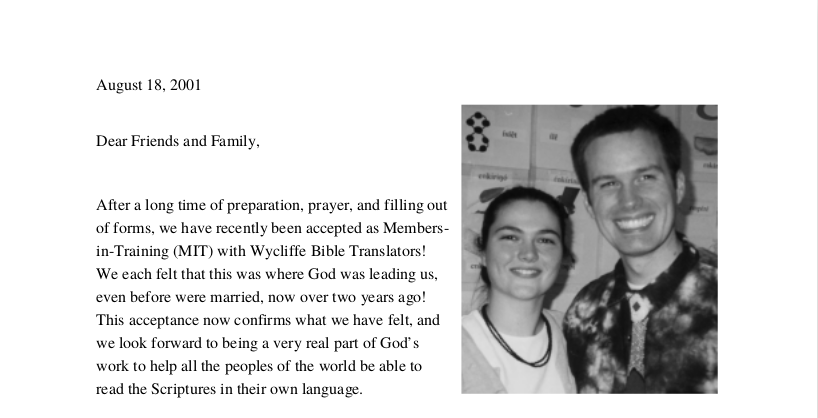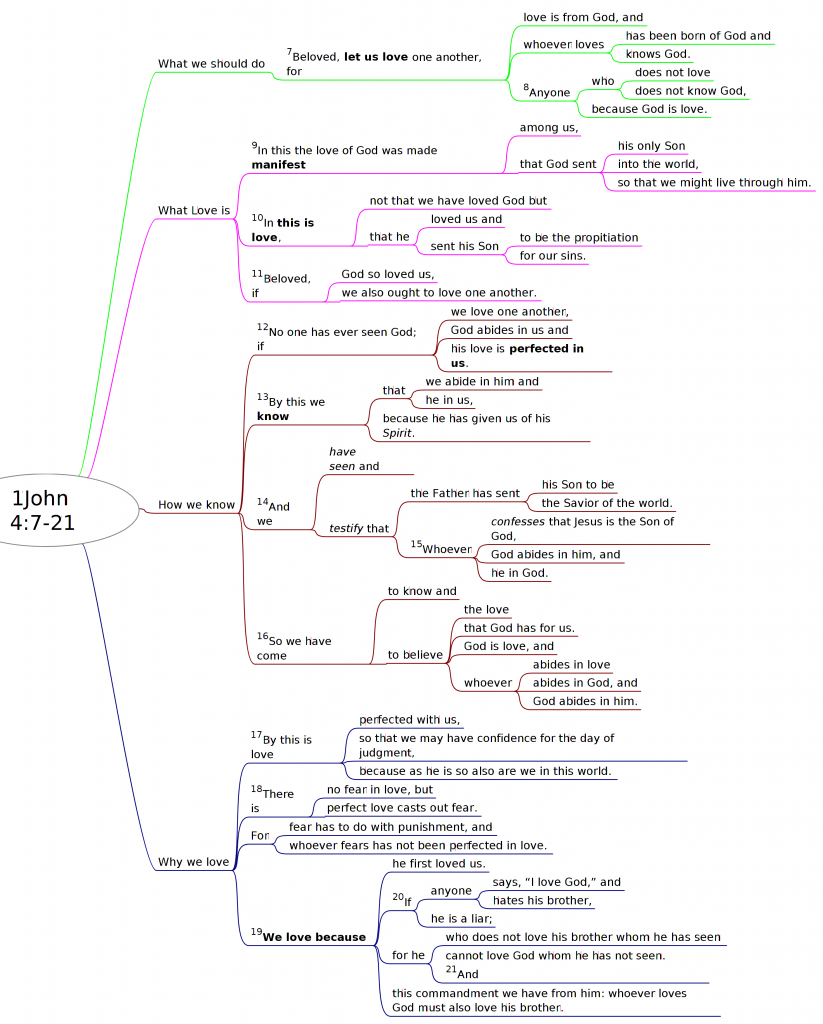 The first time I heard it was Sept 6, 1999. In the wee hours of the morning through the jet lag as newlyweds who naively landed ourselves on assignment in Kenya, the dawn was alive with the exotic melodies of birds. Their songs heralded the beginning of a fresh new day, bathing it in beautiful anticipation, proclaiming God’s glory to all. Through all our years in Kenya, Uganda and Congo these morning songs were a constant joy.
The first time I heard it was Sept 6, 1999. In the wee hours of the morning through the jet lag as newlyweds who naively landed ourselves on assignment in Kenya, the dawn was alive with the exotic melodies of birds. Their songs heralded the beginning of a fresh new day, bathing it in beautiful anticipation, proclaiming God’s glory to all. Through all our years in Kenya, Uganda and Congo these morning songs were a constant joy.
Landing in Cameroon two weeks ago, I subconsciously expected everything to be similar to our life in Congo. Sure enough, some of our favorite things about our previous home – morning birds, huge juicy mangoes, choirs singing in church in colorful fabrics – were similar. Oh how I missed those morning songs!! Cameroon has the same freshly roasted peanuts, red clay roads, long handshakes and strong hospitality. To focus on all the beautiful things, I am tempted to reflect on our Spring Break trip as a fabulous success.
But that would not be the whole story. It was certainly not my success. And it would skip the testimony of God’s power in our lives this past two weeks to stop there. Let us never skip an opportunity to tell of his mighty works even when it costs us something. So we will share the detailed truth that it may bring God even more glory.
Each day several friends ask, “How was Cameroon?”
The short story is: “It was beautiful. And it was hard.”
Vibrantly beautiful and
terribly hard
at the same time.
Complex.
Spiritual opposition often feels like all the cards are stacked against you. Nothing went very smoothly, and God intervened over and over and over to keep us moving forward. He sustained us. Our first obstacle was the denial of visas that left uncertainty over our departure like a cloud until God miraculously delivered new visas the exact day we needed them. Secondly, the 24 hours of flights did not always include foods we could all eat, but God brought a flight attendant to bring us special treats from First Class.
Upon arrival in Cameroon, we realized we had left our Yellow Fever vaccination cards in America. They are required for entry into many African countries and some will even vaccinate you in the airport if you don’t have your yellow card! We were stuck at the mercy of the health department officials. They could have refused us entry or forced us into shots then and there. God gave us favor with one of the officials who decided against protocol to accept our photo images of yellow cards on Kent’s laptop. (Later one woman would try to stop us from leaving the country on the same grounds, but pass us because of the work we do.) God’s intervention for the win!
We settled into our guesthouse rooms and crashed. We had not been prepared for the heat and humidity. We knew there would not be air conditioning. What we didn’t know is that March is the hottest month of the year. So 90-degree days don’t sound too hot, until you factor in 95% humidity with a ‘Real Feel’ of 117 degrees! We were sweating through 3-4 sets of clothes each day, which didn’t help us hydrate after the airplanes. We couldn’t drink enough and we had to focus on filtering enough water for the 5 of us to keep up. The heat sapped our energy and melted our brains, putting us in a fog. Sleeping under mosquito nets seemed to make the heat worse. God kept our filter working quickly, gave us a fridge that worked, a fan to sleep by, and sustained us in a way that doesn’t make sense to me even in retrospect.
Within 48 hours, I was not recovering energy or health from jet lag, I was actually getting worse each day knocked down with the flu. Kent left for his conference out of town. While he was away, I was not sleeping much at night. I think I was allergic to the dusty, lumpy mattress. One night, my lungs began to fill to the point where I felt out of breath to walk a few steps. I am familiar with walking pneumonia, and knew I was in trouble. God intervened. One of my friends was taking me shopping the next morning and I asked her to help me buy an inhaler and allergy meds. She just ‘happened’ to have meds and an extra new inhaler sitting in her house that another missionary had given away! Within 2-3 days with the meds and inhaler my lungs cleared and I could breathe again. I haven’t had allergic asthma like that in maybe 10 years, but it hunted me down on this trip.
Kent’s conference was productive and fruitful, but not without difficulty. He was staying in hotel that some days had water and some days not. God got him through and got him home. He returned safely back to us after 4 days and promptly came down with the flu. For a few days we were both down at the same time. I had a horrible stomach ache that wouldn’t go away. God gently reminded me what the enemy was trying to steal, kill and destroy on our trip. He would love us to call it ‘ruined’ and only remember the ‘bad’. We gathered our family to sing and pray. My stomach ache left and never returned. It was a turning point in my full recovery. Kent had enough of the dusty, lumpy mattress and got a ride to bargain for a new one. God granted him favor with the shop and he bought a wonderful new mattress for 70% of the asking price! We started to sleep so much better!
Through the fog of heat and illness, we were trying to tour available houses for our move this summer, but our time and energy reserves were so low. One hour out of the house required two more recovering. This was made only more complicated by the fact that there were no known houses available big enough for our family. The unrest in outlying areas had many displaced colleagues moving into the city in the past years, so there is a housing shortage. We met one Cameroonian colleague who has 25 family members staying with him! We also had no car, the heat was unbearable and we needed to walk everywhere in the muddy clay. Hour by hour, God gave us the strength beyond understanding to get something done.
Our last 2 days in Cameroon were wonderful. We had strength again. And good friends had planned to come and spend time with us. We hadn’t lived in the same country in 14 years. Sweet fellowship. Time to smell flowers, dry laundry on the line, enjoy the first spring mangoes. In the midst of a minefield of obstacles, James, Joel and Anna enjoyed everything! They enjoyed the foods they remembered from their younger years. They enjoyed meeting new friends and attending their new school. Teachers let them jump right in. Joel chased agama lizards and played in the dirt with the little kids. Anna picked her favorite tropical flowers. James immediately clicked with other teenagers who “get him” as a missionary kid. So much glory. So much beauty. The calm before the return storm.
Our last night in Cameroon, I had a horrific nightmare. I can count on one hand the number of times I have been tormented by a dream like that. It had zero connection to reality. It was pure evil. We fought back with prayer and I began to sing praises to Jesus, which our enemy hates. God carried me through. He is victorious!
Our return home was odd in that every single airport was frought with more obstacles. It seemed that we would never make it home. There was a 2-hour delay leaving Cameroon due to trouble with the fuel truck (?!). There was a strike in Brussels for air traffic controllers, so we boarded and sat on the tarmac another 2.5 hours. This meant we missed our connecting flight in Washington DC by 5 minutes and were stranded. All the while, Anna’s health continued to decline. She was sick to her stomach more and more often and hadn’t eaten much in 2-3 days. We were rescheduled, overnighted in Houston and finally made it home (without bags) the next day. The fingerprints of Grace followed us. Airport personnel cleaning up barf for us. A stranger giving us a plastic bag when we needed one. The airport shop having a ‘sale’ on Tshirts and toothbrushes when our kids needed something else to wear. A hotel with free breakfast enough to feed our boys, and free airport shuttles that run at 1am. God’s grace followed us. (Anna has a parasite and is recovering well at home.)
He sustained us. We would not have survived this trip without his help. We not only survived, we accomplished almost all our goals for the two weeks! So how was our trip?
The verse that comes to mind is Paul’s testimony in 2 Corinthians 4:8-
“We are pressed on every side by troubles, but we are not crushed.
We are perplexed, but not driven to despair.
We are hunted down, but never abandoned by God.
We get knocked down, but we are not destroyed.
Through suffering, our bodies continue to share in the death of Jesus
so that the life of Jesus may also be seen in our bodies.”
If you read this all the way to the end, I pray you have seen the life of Jesus in this story. I pray this post is like the beautiful birds’ song which proclaims God’s glory to all who will listen. If He can comfort, guide, protect and sustain me when I feel like I can’t breathe in a foreign country with flu and malarial mosquitoes at 117 degrees… He can comfort, guide, protect and sustain you where you are too. He sustains in the beautiful hard.
“But you, O LORD, are a shield about me, my glory, and the lifter of my head.”
Psalm 3:3




